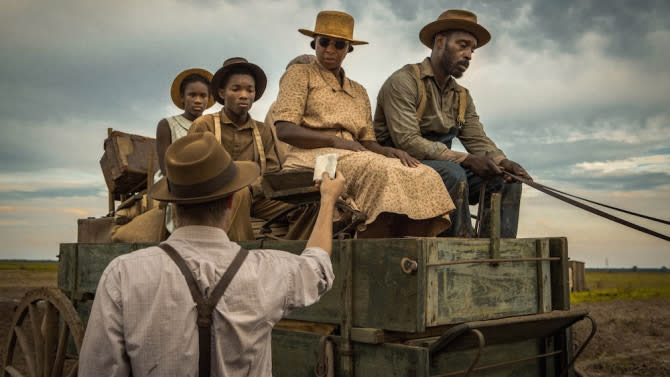Sundance Report: Dee Rees's Powerful, Stunning Jim Crow Drama 'Mudbound' Becomes a Festival Sensation

At the Sundance Film Festival last year, the dramas The Birth of a Nation and Manchester by the Sea made the most noise, locking down major distribution deals and inspiring very early Oscar talk. Birth fell out of favor when a college rape case involving writer-director Nate Parker resurfaced, but Manchester has proven to be an awards contender.
This year, the movie that’s generating the most buzz through the festival’s first weekend is Mudbound, Dee Rees’s powerful and stunning World War II drama based on the 2008 novel by Hillary Jordan. Adapted for the screen by Rees (Pariah) and Virgil Williams, the film follows two families — one white, the other black — living on a Mississippi farm during World War II at the height of Jim Crow laws in the South.
The story begins with the white family, the McAllans. Much to the surprise and chagrin of his wife, Laura (Carey Mulligan), Henry McAllan (Jason Clarke) abandons the bourgeois lifestyle of Memphis to relocate the family — including their young children and Henry’s bigoted father, Pappy (Breaking Bad‘s Jonathan Banks) — to a sprawling cotton farm in the rural Mississippi delta.
There live Hap (Rob Morgan) and Florence Jackson (Mary J. Blige) and their children. Slavery is over when the story picks up in 1946, but as sharecroppers, the Jacksons are still beholden to the farm they work and live on — and the family that owns the land.
Both families have sent soldiers into battle in World War II. Ronsel Jackson (Straight Outta Compton‘s Jason Mitchell) is a sergeant who falls for a German women while stationed in Belgium; Jamie McAllan (Garrett Hedlund) is a playwright-turned-fighter pilot.
Related: Sundance Report: Jessica Williams on Leaving ‘The Daily Show’ for ‘The Incredible Jessica James’
Ronsel and Jamie both return to the farm after the Allies’ victory, and a shared battle with PTSD creates an unlikely bond between them. But tensions arise between the families, and a haunting sense of dread lingers over the film.
In the same way that The Birth of a Nation dramatized the little-told story of the Nat Turner-led slave rebellion, Mudbound acutely captures another story rarely shown on film: the enduring struggle of African-Americans in the hostile Deep South during the years following Reconstruction and the hollow promises of “40 acres of a mule.” It doesn’t matter that Ronsel fought for his country in the war; he’s still treated like a second-class citizen when he returns home.
At the same time, the film also manages to capture the shifting views of the white characters. While Pappy represents blind racism, Jamie and Laura are closer to allies, and Henry occupies the muddy waters in between. Using voiceover from each of the principle characters, Mudbound is ultimately and definitively an American story told from all sides.
It is sensationally acted, with powerhouse performances throughout. If there are standouts to be named, I would have go with Mulligan and the Daredevil breakout Morgan; but the ensemble is so impressive, you could make the case for all five of its male leads as future awards contenders. (I don’t envy whose decision it will be to choose whom to campaign for.) On the heels of last year’s breakout, Janelle Monáe, Blige gives one of the better turns we’ve seen yet from a musician-turned-actor.
There’s nary a false note in the beautifully filmed epic, and critics at Sundance have offered nothing but praise. The Hollywood Reporter‘s David Rooney cites its “slow-burn intensity that builds to a shattering conclusion” while Variety‘s Peter Debruge applauds Rees for finding “shoots of optimism among the mire that couldn’t be more welcome at a moment when the country seems more divided than ever.” Uproxx‘s Mike Ryan hailed it as a “brilliant epic we’ll still be talking about next year at this time.”
As we learned with Birth, it’s likely too early to hail any film as the movie of the year. Still, there’s no doubt you’ll be hearing plenty more about this one in the months to come.

